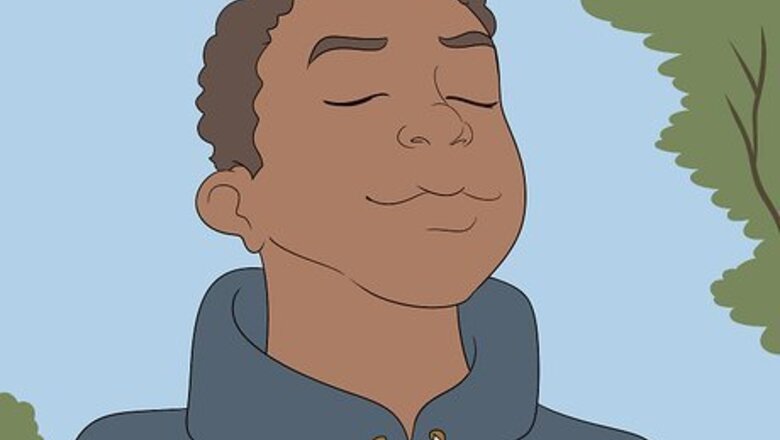
views
X
Research source
While there’s no such thing as too much crying, the tears can take a lot of you, and it’s totally understandable if you’re looking for a reprieve. If you’re upset or on the verge of emotional tears, there are plenty of easy ways to calm yourself down. If depression is making your daily life a bit too heavy, there’s nothing wrong with reaching out for help. You’re not alone in any of this!
Quick Tips

Take a few deep, slow breaths. Breathing is a simple, helpful way to help recalibrate yourself in the middle of a tough crying session. Although it might be tricky at first, inhale through your nose for 4 seconds, holding the breath for another 2 seconds. To finish things off, breathe out through your lips for 8 total seconds. Keep repeating this breathing pattern until you feel yourself begin to calm down and reset a bit. It may take a little while before you’re feeling calm and steady. That’s perfectly okay!
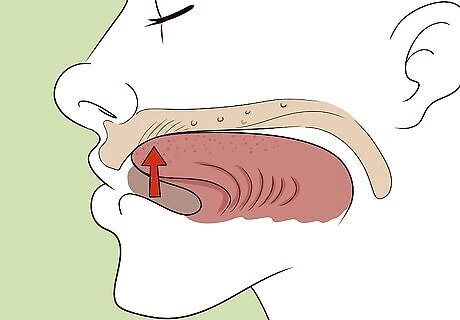
Stick your tongue to the roof of your mouth. When you start crying, it can feel almost impossible to stop. Don’t worry—your body comes with its own reset button. Lift your tongue and press it against the roof of your mouth, which will help you stop your depression crying.
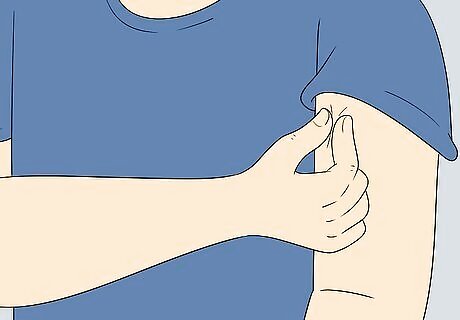
Pinch yourself lightly so you stop crying. Grab an open area of skin on your arm with your thumb and index finger. Pinch the skin together until you feel a slight amount of pain, which will help distract your thoughts away from depression crying. If you’re in public, try to find a section of skin beneath a sleeve, so nobody can see you pinch yourself. Try not to hurt yourself with this—just a small pinch can help keep your tears at bay.

Relax your face so your expression stays neutral. Sometimes, you have to “trick” yourself into not crying. Keep in mind that your eyebrows tend to pull inwards whenever you cry. To fight this, relax these facial muscles, which may stop your tears from falling.
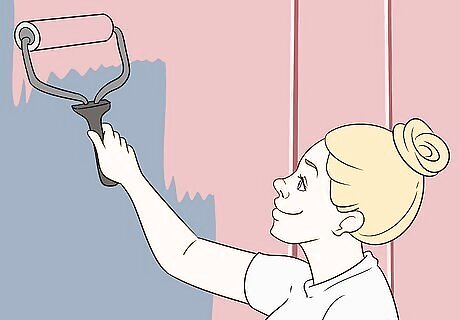
Distract yourself with a fun activity. Pick out some fun hobbies or activities that help take your mind off things. Grab a crossword puzzle, flip on a movie, clean your room, paint your living space, or do just about anything that helps you refocus your energy away from crying. Experiment with different activities until you mind something that works well for you and your emotional needs. If you want to keep up with your social life, you might benefit from calling a friend or loved one.
Self-Care Strategies

Find a healthy routine for yourself throughout the day. Depression crying is an overwhelming symptom, and it’s totally understandable if your day feels a little out-of-whack after a crying session. Try taking little steps to maintain a steady routine—this can be something as simple as waking up or going to bed at the same time, or eating breakfast after you get up in the morning. Focus on changing your routine in baby steps, which might make a difference in your symptoms!

Breathe deeply to help yourself calm down. Chronic stress can be a big trigger for depression crying in your day-to-day life, especially if you’re dealing with a lot of upsetting and confusing symptoms of depression. While breathing can help you stop crying, it’s also a great way to relax. Practice breathing through your nose and breathing out through your mouth, counting slowly in your head as you go. It helps to rest your hands on your chest and stomach while you unwind with some deep breathing. Yoga and meditation are also great ways to wind down.
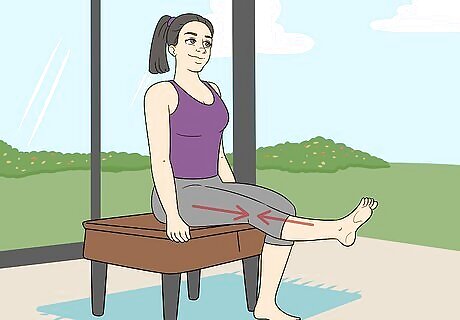
Try progressive muscle relaxation as an easy way to unwind. Find a place in your home where you feel really comfortable and at ease. Sit in a comfortable position and extend your legs out in front of you. Tighten your right foot for 10 seconds, then relax the muscles all at once. Repeat this relaxation exercise throughout your whole body, which may help you let go of your stress. Stress is a pretty common trigger for depression crying, but progressive muscle relaxation might be able to help.

Watch something that makes you laugh. Depression crying can happen for different reasons, or sometimes no reason at all—this can make it really difficult to navigate. Spend an afternoon or evening switching on a funny movie or TV show to help get your spirits up. When you laugh, you’re actually giving your mood a nice boost! To double the fun, watch the movie with a friend or loved one.

Boost your daily mood by caring for a pet. Any kind of pet, whether it’s a dog, cat, or another kind of animal friend, can really help you feel connected, which may make it easier to cope with your depression. As you spend time caring and playing with your pet, remind yourself that your animal companion relies on you for its care and support, which should help you feel needed, wanted, and appreciated. It can be really tough to feel needed or wanted when you’re depressed—an animal can really help tackle these doubts.
Support and Resources

Ask a family member or close friend for emotional support. Depression can make you feel really isolated, or like there’s no point in sharing your thoughts and feelings with those around you. This couldn’t be further from the truth—your friends and loved ones care about you a lot, and are there to listen and help. Try taking a leap of faith and confiding in a trusted friend or relative about how you’re feeling, and see what they suggest. You may feel like a weight’s been lifted off your shoulders! Therapy and doctor’s appointments may seem really intimidating if you don’t have a lot of experience with mental health services. Talking to a loved one might help you bridge that gap a little bit.

Meet with a counselor to talk through some of your mental health problems. Schedule an appointment with a therapist and see if they walk you through a special treatment plan that can really help you, like cognitive behavioral therapy (CBT). Talk to your therapist about your depression crying, and see what kinds of suggestions they have to help your low mood. Visiting a therapist is a big step, but it can provide you with effective treatments to help you tackle your depression. Support groups can be a great source of comfort and understanding when you’re feeling down. You can find one here: https://adaa.org/supportgroups.
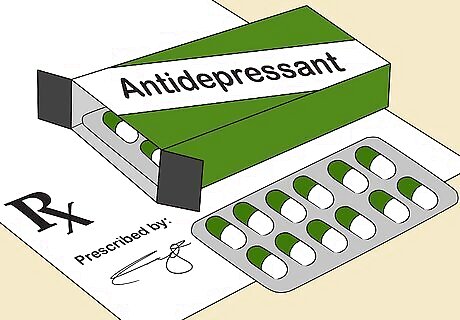
Ask a psychiatrist if antidepressants are a feasible option for you. Meet with a doctor or psychiatrist and let them know how you’ve been feeling. Ask if you can try taking antidepressants for a little while, which might help with your symptoms. Your psychiatrist will be able to help you figure out a safe, manageable treatment plan that will get you on the road to feeling better. There’s nothing wrong with taking antidepressants! Just like any other medicine, antidepressants are designed to help you live and function at your very best.

Call a hotline if you need help in the moment. If the world seems just too overwhelming, you may be finding yourself in a dark, scary place. You’re not alone—if you think you’re in danger of harming yourself, call a hotline and share your feelings with a confidential listener, who can help talk you through your current train of thought. If you're in the United States, you can reach a suicide prevention hotline by calling or texting 988.

















Comments
0 comment